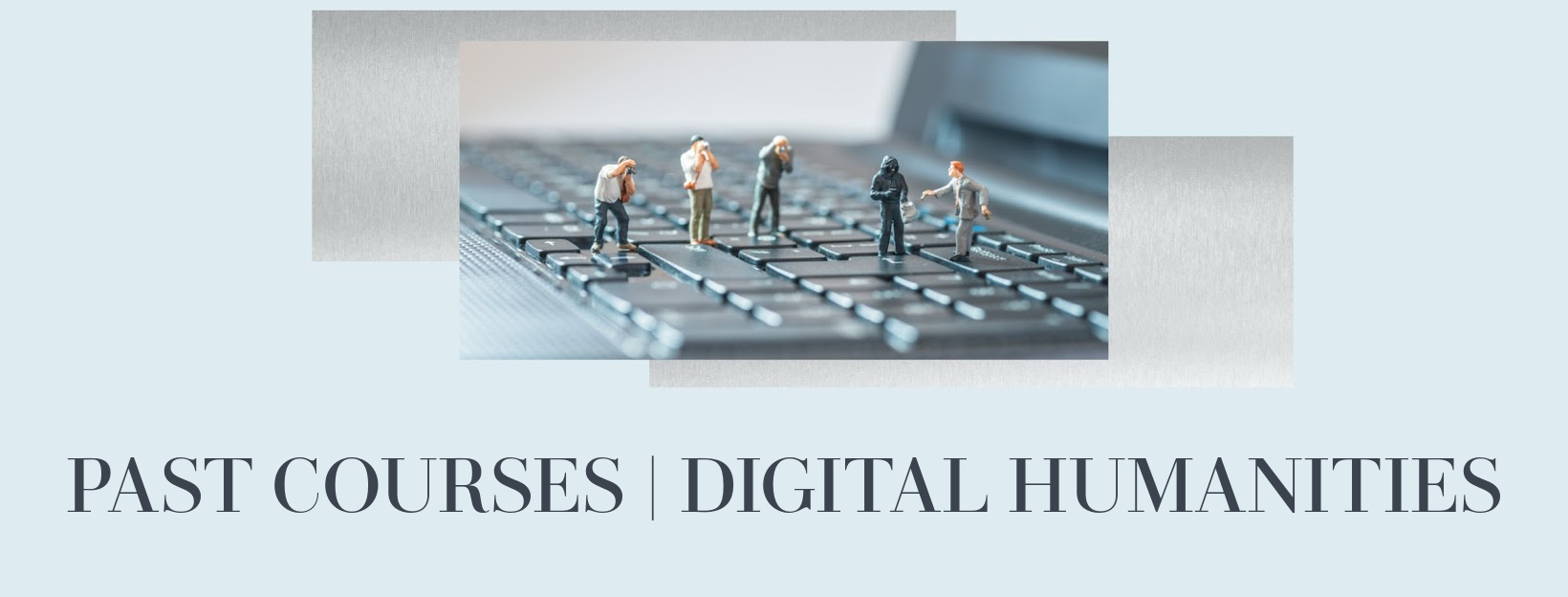|
SPA 410/MLL 410. Digital Literacy Through Cultural and Literary Topics. Fall 2021.
Instructor: Dr. Susanna Allés-Torrent
Course Description: This course introduces and involves students actively into a full stack of digital methods and tools applied to literary and cultural studies, with special emphasis for Spanish. The course is conceived as a first hands-on approach to new methods and general tendencies within the humanities. Students will have the opportunity to deepen their digital literacy, surveying and gaining a general understanding of what is (or are) Digital Humanities and experiencing new ways of exploring digital textuality. They will become familiar with the basic principles of computing, as well as the fundamentals of some markup languages, such as XML-TEI, and techniques of text mining. The course looks towards the many dimensions of texts as data, and the many approaches available to collect, annotate, process, analyze and interpret them; thus, concepts such as textual corpus, semantic tagging, text mining, or topic modeling will be at the core of this course. At the end of the course students will present a digital project along with a long paper connected to the topic’s course and using the language of their choice.
|
|
ENG 395. Data & Society. Spring 2021.
Instructor: Lindsay Thomas
Course Description: Data is often considered the domain of scientists and statisticians. But the proliferation of data and databases across nearly all aspects of daily life – powering everything from the targeted advertisements you see when you go online to the fake news circulating on Facebook to the next financial recession – has made the study and understanding of the concept of data a vital everyday concern. This course provides an introduction to the meaning, uses, and politics of data today. Readings are drawn from literary and cultural studies, media studies, science and technology studies, sociology, information science, and the digital humanities. We will focus in unit 1 on the concept of data, examining its definition, history and relationship to quantification itself. In unit 2, we will explore how researchers in the humanities use data to study culture, and we will analyze existing datasets and create our own. Finally, unit 3 will center on algorithmic processes and what data does in the world. You will complete an algorithm audit for your final project, which will ask you to select and investigate a specific algorithmic process (i.e., Google search autocompletes, or autocorrects in iOS, etc.) in order to understand how it functions conceptually, the data it uses (or might use, if that information is unavailable), and what you see as its most important social consequences.
|
|
SPA 322. Digital Lorca. Fall 2017.
Instructor: Susanna Allés-Torrent
Course Description:
This course is conceived from two different and complementary perspectives: an introduction to digital humanities practices, and the study of Federico García Lorca in its cultural context and his experience in Cuba. On one hand, the student faces multiple issues related to digital culture, and the different ways that technology and the Internet shape social interaction, thinking and communication. It puts special emphasis on the Digital in the Humanities. Cultural institutions and industries, libraries, academia, among many other sectors, have already faced a digital transformation that updates the outcomes of the cultural and humanistic artifacts. During the semester, students will gain both theoretical knowledge on multiple issues, like how the Internet works or how a digital identity is built, and practical experience. We will study in which ways the production of (literary) texts has changed, while analyzing new ways of publication and learning different encoding languages. Concepts such as close reading vs distant reading will give us the opportunity to use different electronic analytical tools. An inside collaboration with the Richter Library will allow students to understand how libraries handle digital collections and the role of metadata within their catalogs and repositories.
On the other hand, the course will delve into the figure of Federico García Lorca and his stay in Cuba. Taking advantage of the Richter Library collection “García Lorca’s Papers”, all students will collaborate in a digital project that involves digital edition, metadata, timelines, and mapping. García Lorca is one of the most relevant Spanish intellectuals at the beginning of the XXth century, and his transatlantic stays, both in New York City and Cuba, shaped him in a particular way. His literary production includes poetry, drama, and prose, and he was in contact with the intellectual and artistic élite of the time.
|




